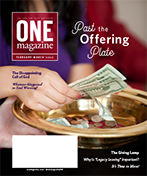
February -
March 2022
Stewardship: Past the Offering Plate
------------------
|





Why Is "Legacy Leaving" Important?
By John Brummitt
Legacy: a gift by will, especially of money or other personal property; something transmitted by or received from an ancestor or predecessor or from the past (Merriam–Webster).
I have been thinking about “legacy leaving” over the last several months. Often, we focus on our legacies and what we will leave to our kids as we get closer to the end of our lives. While the idea of a legacy isn’t something most think about in their 20s, 30s, or even 40s, those are the years we should be preparing our legacy.
The financial world includes a legacy-planning industry. For most people of modest means, this looks something like an estate plan, beneficiary accounts, and telling our kids and loved ones what we would like done after we are gone. Most of the time, legacy planning is an afterthought—or not a thought—until retirement years or we near the close of our working careers. Depending on the survey, only 42-45% of adults have a basic estate plan in place.
Leaving a legacy isn’t something that happens accidentally. Most significant legacies are built over years of cultivating and developing a passion for a particular need. Much attention goes to wealthy “legacy leavers,” and people with more modest means probably won’t have the legacy capital to have a hospital named after them. Yet it is individuals of modest means who support and maintain most non-profit and religious organizations. These “average” donors are the lifeblood of those organizations. When they pass off the scene, if someone doesn’t fill their place with the same passion and drive, the ministry or organization begins to struggle and, at some point, if not corrected, will pass off the scene as well.
Therefore, it is crucial to build and leave a legacy!
God has uniquely gifted you and given you passions to support different ministries and organizations. When you are gone, who will carry that torch? Whether financially or by passing your passion to the next generation, a legacy is the best way to move the mission forward.
Both finance and passion can only be passed on through years of work and preparation. We raise our families to carry on specific values and traditions important to our family identity. As we consider those ministries about which we are passionate and have supported and built throughout our lives, we must consider our plan once we are gone. “Legacy leavers” consider the mission’s success after they leave the scene.
Your legacy to your children is to set them up for success after you are gone, and financial legacy is only one part of that equation. Leaving a lump sum isn’t a legacy but a simple passing of assets.
Legacy leavers give their children purpose beneath their gift of assets.
For instance: leave financial assets to your children designated for grandchildren’s education or help fund annual family get-togethers to ensure your family remains close after you are gone.
If you are passionate about a ministry or organization, what legacy will you leave? For many, local church congregations are second families. We attend, fellowship, and work together throughout our lives, but what happens after we are gone? Legacy leavers purposefully carry on after they are gone. This purpose could be fulfilled through planned giving through the FWB Foundation to replace tithes or by mentoring others to fill our roles when the time comes.
Planning is the key to leaving a legacy. God uniquely gifts each of us to do and be passionate about different things. Let’s make sure those unique gifts and passions do not leave with us when we are called home.
About the Author: John Brummitt became director of the Free Will Baptist Board of Retirement in January 2016. He graduated in 2011 with an MBA from Tennessee Tech University. A 2004 graduate of Welch College, he has been with the Board of Retirement since spring 2006. Learn more: www.boardofretirement.com.
|
|

